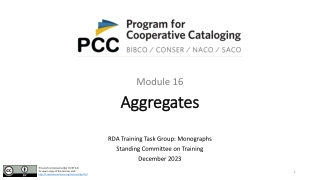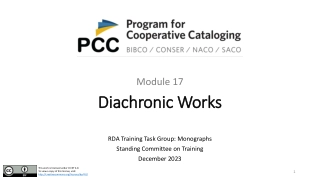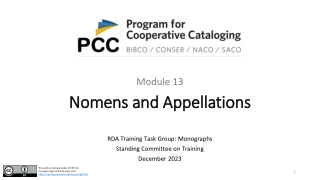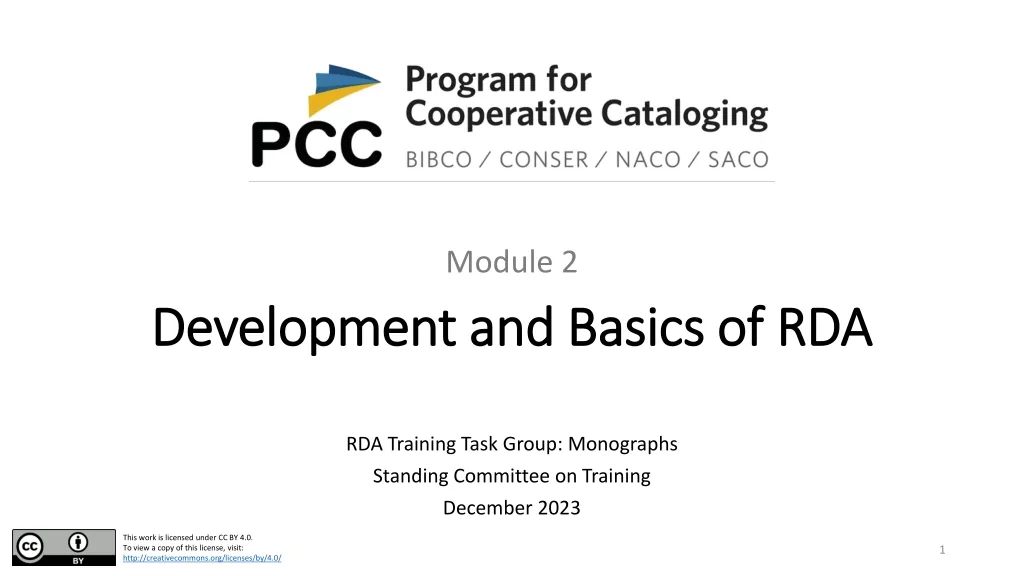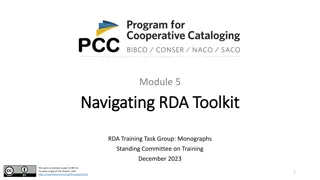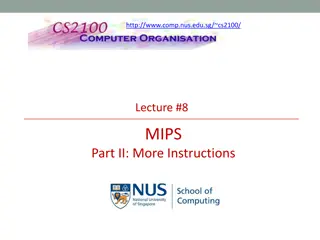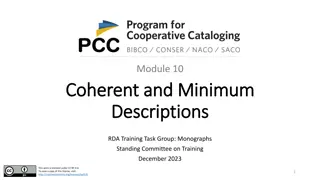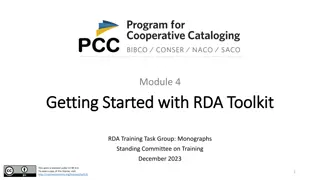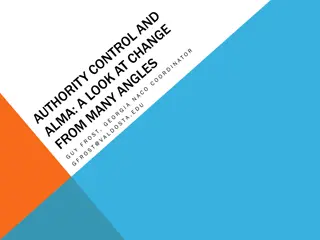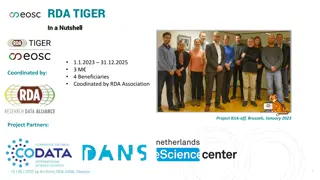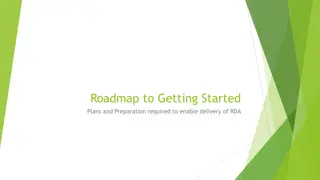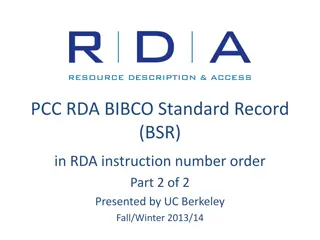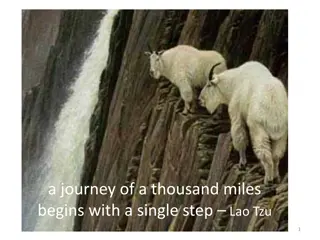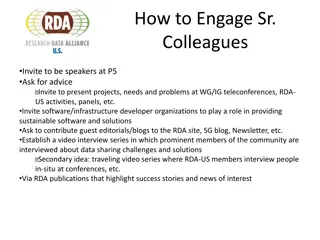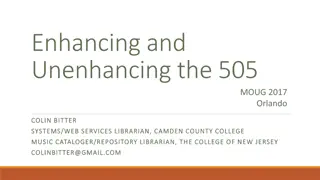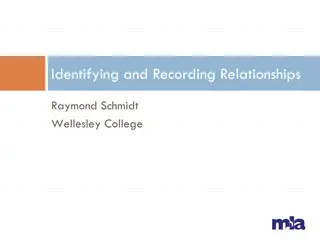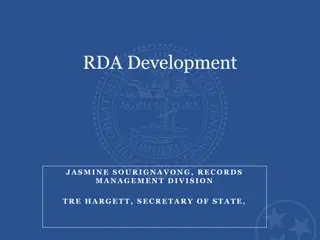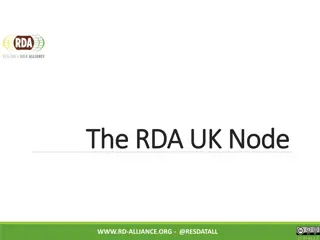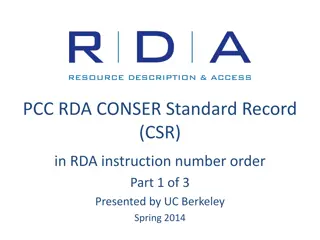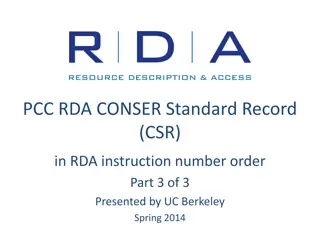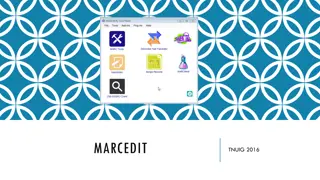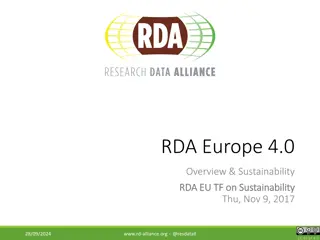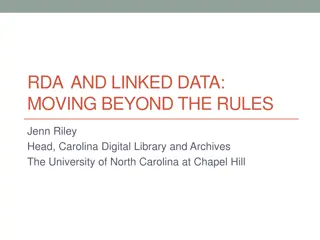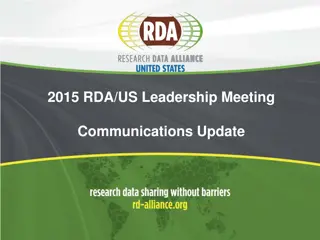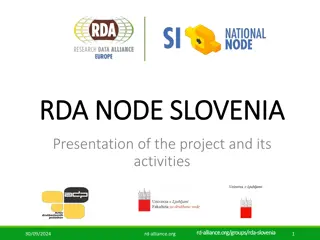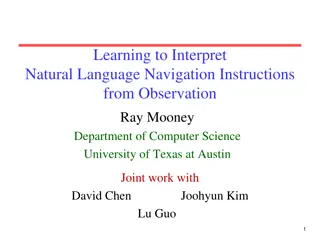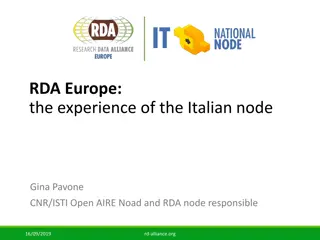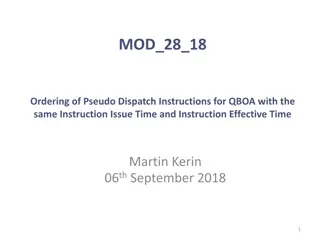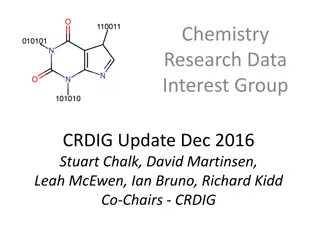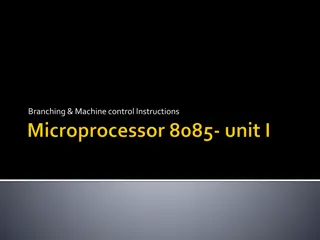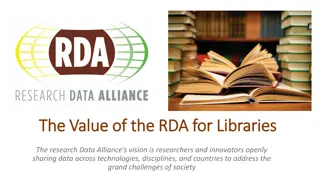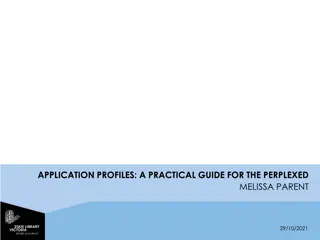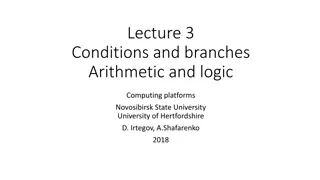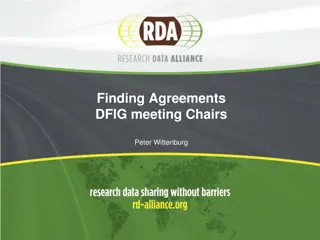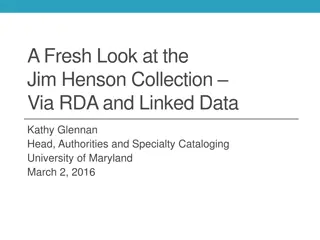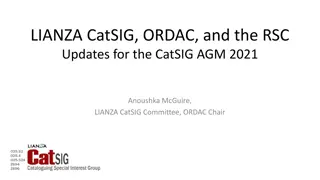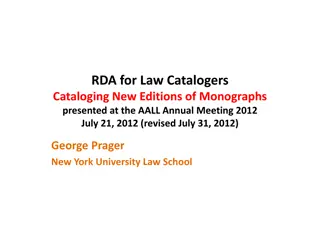Understanding Aggregates in RDA Training: A Comprehensive Overview
Explore the concept of aggregates in RDA training through this detailed module covering types of aggregates, LRM model, user-driven examples, and considerations in describing aggregates. Gain insights into collection, augmentation, and parallel aggregates with practical scenarios.
1 views • 40 slides
Diachronic Works
The concept of diachronic works, learn to distinguish them from static works, understand extension plans, and recognize the significance of WEM lock in determining new works in this RDA training module.
1 views • 67 slides
Understanding Nomen Entity in RDA Training Module
Explore the development of the Nomen entity in RDA training, differentiating nomen and nomen strings, identifying RDA elements for describing a nomen, and examining relationship elements linking RDA entities with nomens. Delve into the origins and attributes of nomens as defined in FRBR and FRAD sta
1 views • 48 slides
Evolution of Cataloging Standards: From Cutter's Objects of the Catalog to RDA Development
The evolution of cataloging standards reflects a rich history dating back to the 19th century, from Cutter's Objects of the Catalog to the development of official RDA. Key milestones include the 3R Project, LRM, RDA Registry, and the shift in cataloging rules driven by changing user needs and digita
5 views • 38 slides
RDA Toolkit User Guide: Navigating Module Features
Explore the comprehensive RDA Toolkit user guide to understand the basic organization, entity and element pages structure, and various features available for navigating the RDA Toolkit effectively. Learn to access and utilize Policy Statements and Metadata Guidance Documentation effortlessly.
4 views • 120 slides
Understanding MIPS Part II: Memory Organization and Instructions
Explore the intricacies of Memory Organization in the context of MIPS architecture, covering topics such as Memory Transfer Unit, Word Alignment, Load and Store Instructions, Making Decisions with Conditional Branching and Unconditional Jumps, Loops, Arrays and practical exercises. Learn about the m
14 views • 43 slides
Understanding Coherent Descriptions of Information Resources
Explore the importance of coherent descriptions in categorizing information resources into work, expression, manifestation, and item aspects. Learn how a well-formed description should conform to basic guidance for effective resource organization and retrieval according to RDA standards.
5 views • 22 slides
Understanding Recipe Essentials for Successful Cooking
Recipes play a crucial role in cooking by providing step-by-step instructions and essential details to recreate a dish accurately. This content delves into key features of a recipe, the importance of following instructions, and the significance of including all ingredients and measurements. It also
9 views • 15 slides
Accessing and Logging In to the RDA Toolkit
Explore the RDA Toolkit, an integrated online product for cataloging-related resources. Learn how to access and log in through IP authentication or institution login to create a user profile effectively.
1 views • 18 slides
Insights into Future MARCIVE and ALMA Authorities
Exploring the evolving landscape of MARCIVE and ALMA Authorities, including transitioning from AACR2 to RDA forms, enhancements with Lexile Data, challenges with erasures by WorldShare Metadata Services, and the development of local authority records. Also, insights on Georgia NACO Funnel collaborat
0 views • 6 slides
RDA TIGER - Internationalization Support for Research Data Alliance Working Groups
RDA TIGER, through its services, facilitates the internationalization of EOSC developments by supporting Research Data Alliance Working Groups. It provides assistance in initiating and running WG, engaging international partners, communicating activities, offering small grants, and helping create im
0 views • 7 slides
Roadmap to Enable RDA Delivery: Plans and Preparation
Decision-making framework, journey consultation, phased return preparation, ongoing review, communication strategies for volunteers and participants, and key steps required by RDA National Office to ensure safety and compliance before riders can return on site are detailed in this comprehensive road
0 views • 9 slides
Understanding BSR, RDA, and UC Berkeley Policy Statements
Learn how to apply the BSR (PCC Core) and UC Berkeley Policy Statements to describe print textual monographs, find RDA instructions and Policy Statements, distinguish differences between AACR2 rules and RDA instructions, and exercise judgment in reviewing RDA copy for the local catalog. Acronyms suc
2 views • 48 slides
Introduction to Programming and Computer Instructions
Programming is the process of creating instructions for computers to follow and accomplish tasks. It involves turning human language instructions into detailed binary machine language. Before learning programming, individuals may have different levels of experience, ranging from no experience to pro
0 views • 16 slides
Cataloging Training Course Overview: FRBR, RDA, BSR
Delve into a comprehensive cataloging training course covering key topics such as FRBR concepts, RDA cataloging instructions, and BSR standards. Each day focuses on specific learning objectives to enhance your understanding of bibliographic records creation. Embrace the journey of mastering FRBR and
0 views • 84 slides
Strategies for Engaging Senior Colleagues and Research Community in RDA Initiatives
Explore a range of strategies to involve senior colleagues in RDA activities, including inviting them as speakers, seeking their advice, and featuring them in guest editorials. Engage the research community through talks, presentations, and student involvement. Utilize enabling factors like stock ma
0 views • 4 slides
Enhancing and Unenhancing the 505
Enhancing and unenhancing the 505 MOUG 2017 Orlando, Colin Bitter, Systems/Web Services Librarian, Camden County College, Music Cataloger/Repository Librarian, The College of New Jersey. Basic vs. enhanced formatted contents notes, library/cataloger preference, indexing OCLC Bib formats, and example
0 views • 22 slides
Understanding Relationships in Resource Description and Access (RDA)
Delve into the intricate web of relationships between resources and persons/families/corporate bodies as outlined in RDA guidelines. Explore the roles of creators, contributors, and compilers in the creation of works, manifestations, and items. Learn about recording creator relationships in MARC fie
0 views • 39 slides
Efficient Records Management Practices and Procedures
Learn about Records Disposition Authorizations, Statewide RDA, Specific RDA, Retention Schedules, and the Benefits of a Retention Schedule in ensuring compliance with laws, protecting records, and reducing costs. Discover the steps to create, revise, or delete an RDA via the web app provided.
0 views • 35 slides
Overview of RDA UK Node Engagement and Activities
The RDA UK Node, funded through the RDA Europe 4 project, aims to maximize the value of UK contributions to the Research Data Alliance (RDA). It comprises various UK organizations and individuals engaged in RDA activities, liaising with EOSC projects and contributing to RDA Council and Foundation. T
0 views • 9 slides
Understanding CONSER Standard Record (CSR) in RDA Instructions
Explore the principles behind CONSER Standard Record (CSR) in RDA instructions through UC Berkeley's training materials. Learn how to apply CSR and UC Berkeley policy statements to describe textual serials and integrating resources in various formats. Discover the differences between AACR2 rules and
0 views • 77 slides
Cataloging Rules and Processes for Textual Resources in RDA
Learning objectives and training provided by UC Berkeley in Spring 2014 on applying the CONSER Standard Record and RDA instructions to describe textual serials and integrating resources in various formats. The acronym review covers core elements and differences between AACR2 rules/AACR2 version of C
0 views • 44 slides
MarcEdit - Comprehensive Metadata Management Tool
MarcEdit is a versatile metadata management tool created by Terry Reese in 1999. Originally designed for MARC records, it has evolved to support various types of data. Key features include MARC editing tools, RDA helper, regular expressions support, task management, and more. Its robust functionalit
0 views • 16 slides
RDA Europe 4.0 Sustainability and Development Overview
RDA Europe 4.0 is a global forum promoting research data interoperability, providing a neutral space for collaboration among 6000+ international experts. It emphasizes problem-solving with bottom-up approaches, aiming to synchronize stakeholders on national, European, and global levels. The sustaina
0 views • 9 slides
RDA and Linked Data: Exploring Beyond the Rules
Explore the intersection of RDA and Linked Data through insightful discussions on leveraging URIs, RDF graph models, and the potential for machine interoperation of library data. Delve into the concept of encoding data in a graph format and the vast possibilities it opens up in the information commu
0 views • 16 slides
RDA/US Communication Update and Goals
This update covers the recent communication activities and goals of RDA/US, a project funded by the National Science Foundation. It includes information on media networking, communication goals, strategic alignment, specific objectives, and engagement initiatives aimed at increasing awareness and en
0 views • 14 slides
RDA Node Slovenia Project Overview
The RDA Node Slovenia project serves as a central contact point between the Research Data Alliance and stakeholders in Slovenia. The project aims to coordinate infrastructure development based on international standards, promote data sharing culture, and engage stakeholders in scientific domains. Ac
0 views • 11 slides
Learning to Interpret Natural Language Navigation Instructions from Observation
This research focuses on developing a system that can interpret natural language navigation instructions by observing humans' actions in a virtual environment. The goal is to create virtual agents capable of understanding and following instructions in video games and educational software, all based
0 views • 51 slides
Italian Node's Experience in Open Science Webinar Series
Explore the journey of the Italian node led by Gina Pavone at CNR/ISTI within the RDA Europe framework. The webinar series focused on collaboration with OpenAIRE NOADs and the Italian RDA node, providing insights into Open Science-related topics, RDA themes, and fostering community engagement. With
0 views • 11 slides
Ordering of Pseudo Dispatch Instructions for QBOA
This document outlines the specific order in which Pseudo Dispatch Instructions (DIs) are to be arranged for QBOA in scenarios where multiple instructions are issued simultaneously. The order prioritizes certain instructions to maintain consistency and alignment with system implementation rules.
0 views • 11 slides
Chemistry Research Data Interest Group (CRDIG) Update Dec. 2016
Recent activities of CRDIG include workshops focusing on chemical structures and terminology, discussions on chemical data standards, upcoming meetings worldwide, and group discussions on aligning chemistry domain efforts with larger research infrastructure profiles like RDA's. The group aims to enh
0 views • 5 slides
Understanding Branching and Machine Control Instructions
This content delves into the intricate details of branching and machine control instructions in programming. It explains the three main types of instructions - JUMP (JMP), CALL, and RETURN - along with their subtypes and functionalities. The unconditional and conditional aspects of JUMP, CALL, and R
0 views • 18 slides
Enhancing Libraries' Role Through RDA Engagement
Explore how libraries can benefit from engaging with the Research Data Alliance (RDA), including opportunities to interact with data professionals, researchers, and academics, enhance expertise, and contribute to global data interoperability solutions. Discover the value of RDA for libraries and inf
0 views • 10 slides
Application Profile Development Guide
Learn how to create effective application profiles for efficient resource description, utilizing practical methods and encoding schemes. Understand the importance of application profiles in supporting RDA Toolkit templates and enhancing resource recording and transcription processes.
0 views • 19 slides
Understanding Arithmetic and Logic Computing in CdM-8
Explore the fundamental concepts of arithmetic and logic computing, including conditions, branches, arithmetic instructions, logic instructions, shift and move instructions, and the practical applications of shift operations. Delve into CdM-8 flags semantics, C and unsigned subtraction/comparison, b
0 views • 14 slides
Advancing Data Interoperability through DFIG Meeting Insights
Explore the key discussions and suggestions from a recent DFIG meeting chaired by Peter Wittenburg. Topics include addressing data heterogeneity, leveraging RDA for change, engaging with active groups, and proposing strategies for progress like defining data bundles and focusing on persistent identi
0 views • 10 slides
Exploring the Jim Henson Collection and R-Balls
Delve into the Jim Henson Collection at the University of Maryland, showcasing 75 digital videos spanning 35 years of Henson's groundbreaking work in television and film. Discover how R-Balls, a collection of linked data, provide in-depth information on entities related to RDA elements, Works, Expre
0 views • 46 slides
Updates from LIANZA CatSIG, ORDAC, and the RSC: AGM 2021 Overview
Explore the latest updates from the LIANZA CatSIG Committee, ORDAC, and the RDA Steering Committee. Learn about their roles in maintaining resource description standards, promoting RDA implementation in Oceania, and representing the interests of users in the region. Meet the dedicated representative
0 views • 23 slides
Overview of RDA: Resource Description and Access
An in-depth look at RDA (Resource Description and Access), covering its origins, development by the Joint Steering Committee, transition from AACR3, and key concepts such as representation principles and data sharing beyond libraries. The test period of RDA Toolkit revealed its impact with over 10,0
0 views • 27 slides
Cataloging New Editions of Monographs: RDA Guidelines
This presentation by George Prager of New York University Law School, given at the AALL Annual Meeting 2012, focuses on RDA guidelines for cataloging new editions of monographs in the field of law. It provides insights and strategies for ensuring accurate and effective cataloging practices for law l
0 views • 37 slides
